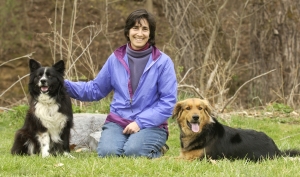Summer is the season that evokes anxiety in many animals who are sound sensitive. Sounds like thunder, gun shots, cars backfiring, fire works, explosive sounds, sirens, pounding rain on roofs may all elicit anxiety from dogs.
Trainers and veterinarians have used many techniques to deal with reactivity to sounds ranging from punishment, negative reinforcement techniques, positive reinforcement, confinement, comfort and medications.
Looking at behaviors in relation to the fight, flight, freeze reactions can offer a new perspective and fuller understanding of what is going on for your animal. A new vantage point can offer compassion. I am not advocating that the behavior is excused. Often we simply do not know what to do to help behaviors that are difficult.

I have found a number of holistic tools such as using Essential Oils, Tellington TTouch and Flower Essences to be helpful with a wide variety of anxieties and fears with dogs. Understanding what is going on can help you choose compassionate methods, give solid ideas on what can be useful, and help you understand why some methods don’t work easily.
Motivating Forces: Instincts
Instinctual reactions for people and animals are normal when danger is perceived. Fight, flight, freeze, faint or fool around are instinctual reactions that are elicited under a variety of circumstances. A natural instinct for animals when they are scared in the wild is to fight, flee, freeze, faint, & under some circumstances to fool around.
Let’s look at why this occurs and what is needed in order for the body to RUN for your life, Fight as if your life were at stake, or Freeze to make yourself invisible – to save your life. Certain body functions are needed for survival.
The sympathetic nervous system is activated with stress. In part, the sympathetic nervous system regulates the size of the pupil, gut motility, urinary output, and secretes adrenaline. This stress reaction is commonly known as the fight-or-flight response.
Some Symptoms of High Anxiety, Fear, Panic;
- Nervous and unsettled
- Shallow breathing, panting
- Pacing
- Vomiting
- Destructive behavior like chewing or clawing at furniture, walls, windows
- Escape attempts
Regulating the safety of the body under stressful circumstances with perceived danger is the primary function. This works really well out in the wild for animals. Under domestic situations however, our reactions do not always get along easily with everyday life.
Science typically looks at the Sympathetic Nervous System as an automatic regulation system, that is, one that operates without the intervention of conscious thought.
So, when this reaction to stress is elicited with thunderstorms, fireworks, gunshots or other similar scary situations parts of the brain that are stimulated do not involve conscious thought or thinking processes. Adrenaline is pumping so the need to move or fight is activated. Fear, anxiety, panic are all part of this response.
Have you ever thought your horse or dog is really smart and can’t understand why they can’t think under certain circumstances? Have you ever thought that your animal must be stupid because they can’t learn something new when they are at the vet’s office, or when a loud noise is scaring them, or when they are highly stressed?
Have you ever been scared and cannot think clearly? Or ever been really upset and cannot be soothed out of it? Has anyone ever told you to “Just get over it?” Or ‘Just relax!” Or perhaps you have wanted to relax or fall asleep at night but you just cannot make yourself just relax or sleep?
Our survival instinct is extremely strong and not easily overridden by ‘thinking.’ Just as you cannot tell yourself to have a good night’s sleep, you cannot easily tell yourself ‘do not freeze.’ Your body chooses according to what it perceives rather than what you think.
The same thing happens for all of us, dogs, horses. When scared or when they perceive danger their sympathetic nervous system is being activated, this is when it is difficult to ‘make’ them relax or get someone to think under these circumstances. The Sympathetic Nervous System is the same regulation system that operates without engaging conscious thought, and it is the system that activates adrenaline and the fight, flight, freeze reactions.
When super scared, an animal may run from noise to find safety in a natural hideaway like a den or burrow. When your dog is scared of thunder does it want to go into the closet, basement or find a place to hide?
Possible Overstimulating Circumstances
- State of high excitement to the extent that they will cease to think clearly
- Other dogs barking may excite some dogs
- Babies or noises we make to placate or stimulate babies may excite some dogs
- Vehicle engines, car doors slamming, horns or tires squealing
- Doorbells, ring tones of telephones and alarms may excite.
- Even the sound of traffic or trains from several miles distant may be heard by a dog. Sounds that are not apparent to us can effect dogs.
Dogs are constantly bombarded with noise that we often take for granted. Our minds will often block out many of these sounds. Dogs have significantly better hearing and some may find this blocking out process more difficult.
Common theories and methods in dealing with fears and noise sensitivities;
- Distract from the noise or situation with food, activity or sound . Moving around and keeping the dog active and its mind off the problem, trying to play.
- Showing that there is nothing to fear from a situation.
- Not allowing the dog to hide behind you or to fall flat at your feet. And for the person not to go down to the dog and offer a cuddle.
- Exposure to the stimulating sound to become acclimated, therefore becoming immune to its effects. Playing recording of noises, played at very low level in the background and carry on life as normal
- Distract the dog through other sounds like running a fan, radio or TV for distraction and sound muffling.
- Remove the dog from the situation.
- Confinement in a crate, a room, garage, etc.
- Medications
- Comforting
When understanding the strength of the fight flight instinct and the power of the sympathetic nervous system, we can gain more understanding why in some cases these methods might not work so well. These methods do not deal with the underlying fear, perceived danger and intensity of instincts that generate heightened arousal of the sympathetic nervous system.
Holistic Tools Whatever the cause of the noise anxiety, you can take definite steps to help your dog. Here are a few of the tools that I have found to be extremely useful for calming and positively influencing anxieties and noise sensitivities.
Essential Oils Freshly cultivated and steam distilled, the essential oils in Young Living’s collection are life-enhancing gifts from the plant kingdom, revered for centuries for their restorative properties to body, mind, and spirit. Young Living’s therapeutic-grade essential oils deliver positive benefits to the body through smell, direct absorption into the skin, and by normal digestive processes. Young Living’s essential oils supports wellness and may have many health benefits.
Flower Essences are energetic tools. They offer us information of an energetic nature. We experience them energetically and use them in our energetic systems, something I also refer to as our electrical systems.
Tellington TTouch is a gentle approach to enhancing behavior, health & performance. More than just a training method, it combines easy to learn bodywork, leading exercises, and ground exercises.
If you would like to learn more about these tools and ways to use them for noise sensitivities with dogs, I am hosting a free teleseminar Tuesday June 22, 2010 from 7-8pm EST to discuss Thunderstorms & Dogs; Essential Oils and Other Holistic Tips. Sign up even if you cannot make it on Tuesday night to receive the playback number. For more info on the class, scroll down for my previous post.
This audio is helpful for those with dogs, or for anyone who has experienced Anxiety, Trauma or Stress in their lives, including humans, horses or other animals.
This Teleseminar is over. Sign up with the One Heart Newsletter in the upper right hand corner for updates on similar classes, my soon to be released Quick Reference Guides and other related goodies!
 Sandy Rakowitz of One Heart Healing Center for People & Animals offers a professional perspective with 20+ years experience in the field of Animal Wellness. Sandy offers private sessions in person and via telephone or Skype with TTouch, Energy Healing Medicine, Animal Communication, Young Living Therapeutic Essential Oils for people and animals.
Sandy Rakowitz of One Heart Healing Center for People & Animals offers a professional perspective with 20+ years experience in the field of Animal Wellness. Sandy offers private sessions in person and via telephone or Skype with TTouch, Energy Healing Medicine, Animal Communication, Young Living Therapeutic Essential Oils for people and animals.
Set up an appointment with Sandy for an action plan of ways to help your dog.

[…] Anxiety/ Fears: Sometimes anxiety can bring on shaking or tremors. A shaky nervous system can get more easily activated or ‘inflamed’ from anxiety as they age. In other words, as they age, they may simply be more sensitive then they used to be. Try the next tips listed. […]